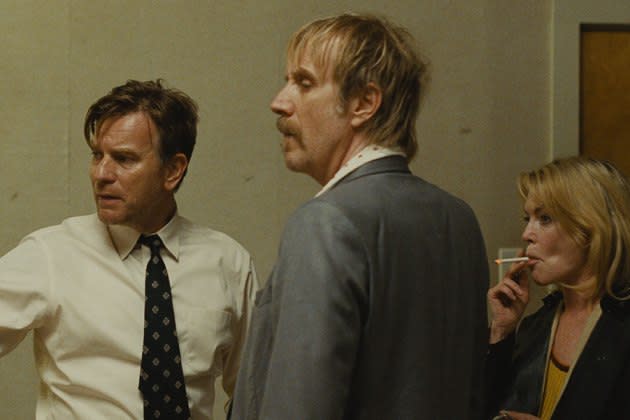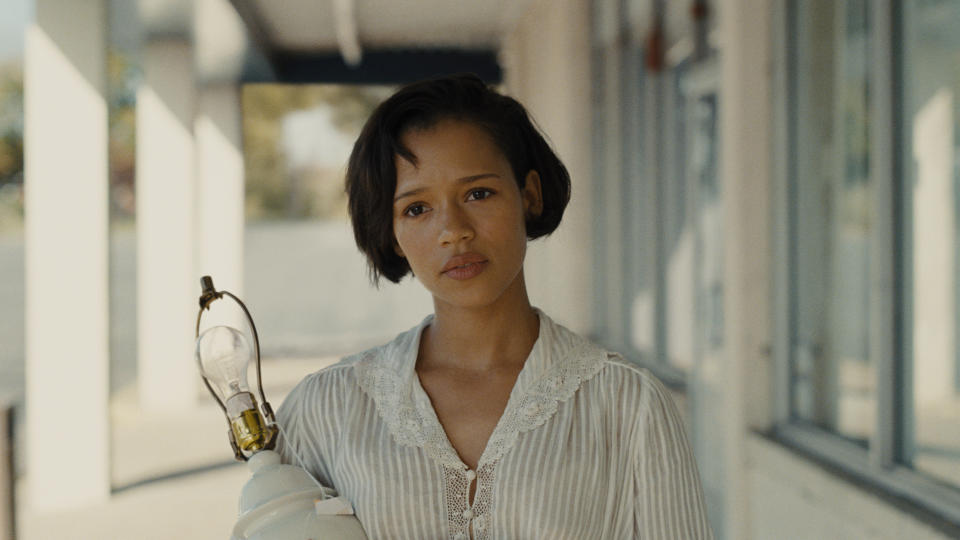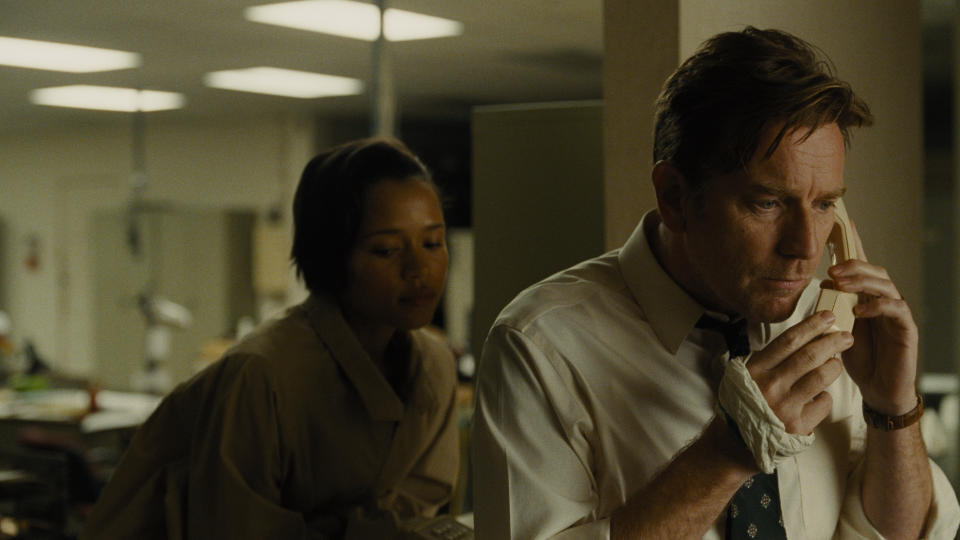‘Mother, Couch’: Sara Murphy & Niclas Larsson Discuss Their Secretive TIFF Competition Title Starring Ewan McGregor And Taylor Russell
- Oops!Something went wrong.Please try again later.
- Oops!Something went wrong.Please try again later.
- Oops!Something went wrong.Please try again later.
- Oops!Something went wrong.Please try again later.

Licorice Pizza and If Beale Street Could Talk producer Sara Murphy arrives at TIFF this week with the intimate yet ambitious feature Mother, Couch, the first project produced under Fat City, the production label she launched last year alongside War Pony producer Ryan Zacarias.
Starring Taylor Russell, Ewan McGregor, and Ellen Burstyn, the pic is written and directed by Swedish filmmaker Niclas Larsson in his feature film debut. The story is adapted from a novel of the same name by Swedish filmmaker Jerker Virdborg.
More from Deadline
“The book is very different from the film,” Larsson said of his adaptation. “In fact, the first thing I asked Jerker was how free I could be with the adaptation, and he said, ‘Look, steal whatever you want to steal, and go with it.’ So that’s that’s what I did.”
The biggest change Larsson made on screen was moving the story from Sweden to the US. His abstract plot follows Mother (Burstyn), who stations herself on a green couch in a remote furniture store, refusing to get up, leaving her three estranged children – David (Ewan McGregor), Gruffudd (Rhys Ifans), and Linda (Lara Flynn Boyle) to figure out why. With the help of the store managers, Bella (Taylor Russell) and Marco & Marcus (F. Murray Abraham), David and his siblings embark on a mind-bending journey to reveal life-altering family truths.

Aside from early production notes — the pic is a US-Danish-Swedish co-production, with Film i Vast and Snowglobe on as co-producers — there is very little officially or unofficially out there about Mother, Couch. In fact, the film had been entirely off-the-grid until it was announced as a competition pic at San Sebastian.
“There is something about keeping a film private and sacred for as long as you can before exposing it to the world,” Murphy said of the production’s decision to work covertly.
Below, Murphy and Larsson speak with Deadline about crafting their secretive movie, how they landed an A-list ensemble, and working between Europe and the U.S..
DEADLINE: Niclas, this is your first feature. Let’s start with your story. How did you get here with Mother, Couch?
NICLAS LARSSON: I’ve been making music videos and short films for quite a while. It’s a classic story. I dropped out of film school and started making my own stuff. I stumbled upon Jerker Virdborg’s book and knew it was what I wanted to do. I’d written a few features that didn’t get off the ground, but I wrote this film quickly, sent it off to Sara, and we just did it.
DEADLINE: Sara, you’re a producer who has worked with some real masters, including Paul Thomas Anderson and Eliza Hittman. What made Niclas an attractive proposition?
SARA MURPHY: As a producer, one of the most rewarding things about the job is seeing a new voice come into the world. That’s what you are always trying to do. Niclas’ script came to me through his agents. It was beautifully written, and I hadn’t read the Swedish book, but the adaptation was so well observed. I was excited to meet with him. I had a little bit of familiarity with his previous work, and we had a great meeting. It was a pleasure to meet somebody who was so self-assured, especially at such a young age. He knew what he wanted to do and how to do it, and I think that’s a very easy thing to immediately get behind.
DEADLINE: Niclas, Jerker Virdborg’s novel wasn’t set in America was it?
LARSSON: No, and I hope after the movie is out, it’s translated into English because it’s quite a good book. The book is very different from the film. In fact, the first thing I asked Jerker was how free I could be with the adaptation, and he said, ‘Look, steal whatever you want to steal, and go with it.’ So that’s that’s what I did. I added the locations and set it in America, but I feel it’s also very Swedish. It’s like IKEA, and everything is very Roy Anderson. I hoped it was going to be more American than it turned out.

DEADLINE: When this film was first announced for San Sebastian, many people were surprised. The film seems to have been made completely off the radar. Was this by design?
MURPHY: We weren’t making it in secret. But there is something about keeping a film private and sacred for as long as you can before exposing it to the world. Also, to free it from any sort of external forces. So yes, we kept it very quiet despite many people wanting to do press releases. I hope that makes people that much more excited to see it.
DEADLINE: Niclas, this cast is impressive, particularly for a debut filmmaker. How did you land this ensemble?
LARSSON: There were two versions of this film that Sara and I mapped out. The first featured only new actors and no stars. The other version featured all superstars. I was intrigued about having an all-star cast because of the stage-like vibe of the overall film. It’s like going to a good play on Broadway where you watch these huge stars in an intimate setting. So, we started reaching out to who we had on the list. The cast you see are all our first choices. They all attached fairly easily except Ellen. She needed a bit of convincing to play the part.
DEADLINE: Mother, Couch is an intimate story but visually it’s quite ambitious. What was the production like? What range of budget were you working with?
MURPHY: We did have a limited budget. I have to give it to Niclas, our DP, Chayse Irvin, and our production designer, Mikael Varhelyi. They did an incredible job squeezing every last drop out of our resources to put on the screen. We shot it over 27 days in North Carolina, primarily on a stage, which was Niclas’s choice. He said we should build it all out on a stage. We said no, we couldn’t afford that, but ultimately, all our locations fell apart, so we magically had to build the whole thing. And it worked.
DEADLINE: Niclas, I see so many influences in this piece. There’s Paul Thomas Anderson’s ‘Punch Drunk Love,’ and parts feel like Lars Von Trier. What exactly were you pulling from?
LARSSON: All of the above. When it comes to cinema, I like old shit. I wanted to make Billy Wilder comedy or something by Altman. I love those old things and obviously Punch Drunk Love, but if you go further back, that’s Paul stealing from Jacques Tati. So I just watched loads of those theater-like comedies. I wanted to make some like that.
DEADLINE: Sara, is this the first piece under your Fat City label?
MURPHY: It is. It’s the first one that we’ve done under the banner. It’s very exciting.
DEADLINE: How does this film and a filmmaker like Niclas fit into what you’re building with Fat City?
MURPHY: We’re looking to tell stories that are risky, unknowable, challenging, and don’t necessarily fit into any definitive box. Mother, Couch is a wonderfully challenging film. Audiences will have completely different responses across the spectrum, and that’s exciting to see. It demands an audience to show up for it. That was in the DNA of the script, and that’s the kind of work we would like to support.
DEADLINE: Niclas, you’re Swedish, and so is the source material, but this film is very much American. Why did you decide to leave Europe for your debut, and do you think your decision says something about contemporary filmmaking in Europe?
LARSSON: I’m a 90s kid. I grew up with American culture more than Swedish culture. I started watching Swedish films in my teens. I’m a Disney kid. I was 13 years old when 13 Going On 30 was released and The Princess Diaries. I love all those big, magical Hollywood films. I can still go back to those films today. I respect European cinema and Swedish cinema. We have some great directors coming out of Sweden, Denmark, and Norway. But it felt surprisingly natural to view this film in America. I know American cinema way better than Swedish cinema, to be honest. I just know how it sounds, the references. It’s been embedded in my bloodstream from a very young age. And the films I have in my head for my next chapter are also all American.
DEADLINE: What will be a success for you both with this film?
LARSSON: $150 million. Truthfully, I would love for as many people as possible to see this film because I think it’s a very broad movie. It’s a film for everybody. I hope for the entire world to see it.
MURPHY: I agree. I would also like to get $150 million for the next one.
DEADLINE: Next one? Are you planning to sign Niclas up for the next one?
MURPHY: Yes!
Best of Deadline
Venice Film Festival 2023 Photos: The Red Carpet Premieres & Closing Ceremony Winners
SAG-AFTRA Interim Agreements: Full List Of Movies And TV Series
2023 Premiere Dates For New & Returning Series On Broadcast, Cable & Streaming
Sign up for Deadline's Newsletter. For the latest news, follow us on Facebook, Twitter, and Instagram.

